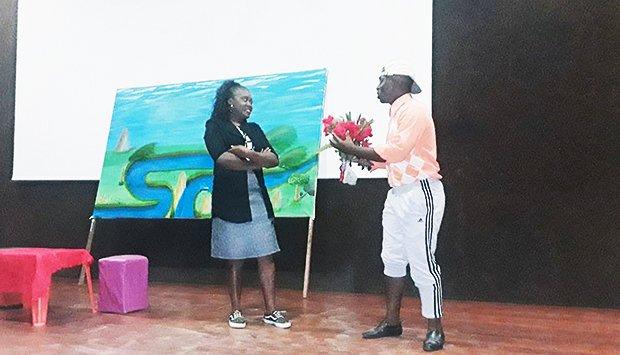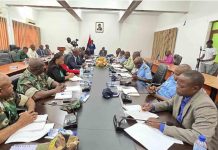Africa-Press – Angola. The project to massify the performing arts in schools in the 11 municipalities of Huambo, as of last year, has been stopped until today, due to restrictions created by the pandemic, the president of the Provincial Theater Association, Alexandre Kanguenha, reported yesterday.
For the president of the Provincial Theater Association, the initiative would encourage children to learn the first techniques of staging and create, from an early age, a taste for dramaturgy. Despite the obstacles, he guarantees, the project “is not forgotten and will be sent to the local Education office for approval of access to primary schools, I and II cycles and also to the permission of teachers in training seminars”.
The teachers, he explained, will have seminars so that they learn the appropriate expressions of theater and are able to transmit to the students, in a correct way, the basic techniques of staging. “We will thus be sowing the first seeds of theater in schools,” she said.
In a first phase, he detailed, the project will be aimed at students of primary education, I and II cycles, “because they are the basis of social learning”. Afterwards, he says, they intend to take the initiative to higher education students.
“Huambo has already participated in a national university theater festival. Now if we start doing theater empirically, future generations of actors will have a bad fate. That is why it is essential to invest in academic and professional training”, he attested.
The idea, he reinforced, is to make Huambo, in a short space of time, the “breadbasket of theater” in Angola, based on the professionalization of playwrights, actors and scenographers. The association, he said, intends to create a Higher Institute of Fine Arts . “It’s a training chapter that culture makers have been clamoring for for a long time. After all, theater is science.”
The transfer of legacy, he defended, must be processed according to certain assumptions, in which training is crucial, “in order to achieve, without any problems, the massification of the activity in the whole extension of Huambo”.
Most theater groups, he said, are concentrated in the municipalities of the provincial capital, Huambo, and in Caála. The remaining municipalities, he explained, have, on average, two to three groups, some quite expressive in terms of casts, reaching over 40 elements. “It’s a sign that the theater has acceptance and audience,” he said.
Normality
The more than 37 theater groups, with a thousand actors, are currently “breathing” with relief, after two years of inactivity and applauding the resumption of normal shows. a step that Alexandre Kanguenha considers “formidable” for the survival of the class.
“There is a formidable evolution after two years without activity, due to Covid-19. It is a healthy gain for groups that can return to producing regularly”, he said. The theater, as an intervention activity at the social level, is, he specified. , an “excellent art to sensitize communities”, with activities even in churches and schools. “It is in these meetings that, every month, new talents are born”, he said.
The lack of theaters in Huambo is one of the main difficulties that groups face in order to perform with the best performance. “Hope is the completion of the construction of the Cultural Center, whose works, paralyzed for more than seven years, have been resumed”.
Survival
Alexandre Kanguenha also revealed that theater groups have survived thanks to the contributions of the members, so he regrets the little or almost non-existent support of the business class for this cultural art.
“We need institutional support and companies that are more committed to the theater. The support from Cuca is to be commended, as it has been one of the main sponsors of artistic activities at the local level. However, we have had some obstacles due to ethical issues with this company” , he said, adding that the actor has the role of educating society, especially young people, about certain practices, a fact that sometimes creates a conflict of interest with sponsors.
Theater, he continued, has accompanied all social movements, especially in communities, and seeks to awaken citizens’ awareness of a change in mentality. “We are society’s educators. We were present in the country’s most difficult moments, appealing to the fight against mines, domestic violence, diseases and other social problems,” adding that an example of this is the prevention campaigns against Covid-19, adherence to vaccinations and the Single Public Service Desk (BUAP) to update the register. “It is a serious commitment to the homeland”, he underlined.
For More News And Analysis About Angola Follow Africa-Press






